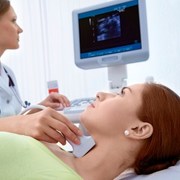Find out what additional tests Dr. Friedman performs to evaluate the TSH levels by listening on the EmpowHer podcast.
Hypothyroidism Diagnosis
Diagnosing all types of hypothyroidism is important, because treatment with thyroid hormone will improve symptoms in patients with hypothyroidism, but is unlikely to help those who do not have hypothyroidism. In primary hypothyroidism, the thyroid gland, located in the neck, is less able to produce the thyroid hormones, T4 and T3. The pituitary gland, located in the head, responds to this deficiency by secreting more TSH. Thus, in more mild cases of primary hypothyroidism, T4 and T3 levels are normal, but the TSH is high. In more severe cases, T4 and T3 levels drop. Although the normal range for TSH is often between 0.5 and 5 mU/mL, values at
the high end of the normal range may be abnormal. T3 is the more bioactive hormone compared to T4, but T4 is more stable in the circulation.
My approach to diagnosing hypothyroidism is to start with a careful history and physical. Then an Endocrinologist should perform a hands-on thyroid examination to determine if the patient has a goiter. Blood TSH, free T4, free T3 and anti-TPO antibodies should be tested. Patients with an enlarged thyroid and/or a positive anti-TPO antibody test AND a TSH> 4.0 mU/mL should be considered to have primary hypothyroidism. Patients without an enlarged thyroid and
without a positive anti-TPO antibody test but WITH a TSH> 7.5 mU/mL should also be considered to have primary hypothyroidism. Patients with a free T4 of < 0.9 mg/dL and a TSH< 1.0 mU/mL are likely to have central hypothyroidism. Patients with symptoms of hypothyroidism but who do not meet these criterion should be watched and retested in 6 months.
More on Dr. Friedman
Theodore C. Friedman, M.D., Ph.D. has opened a private practice, specializing in treating patients with adrenal, pituitary, thyroid and fatigue disorders. Dr. Friedman has privileges at Cedars-Sinai Medical Center and Martin Luther King Medical Center. His practice includes detecting and treating hormone imbalances, including hormone replacement therapy. Dr. Friedman is also an expert in diagnosing and treating pituitary disorders, including Cushings disease and syndrome.
Dr. Friedman's career reflects his ongoing quest to better understand and treat endocrine problems. With both medical and research doctoral degrees, he has conducted studies and cared for patients at some of the country's most prestigious institutions, including the University of Michigan, the National Institutes of Health, Cedars-Sinai Medical Center, and UCLA's Charles Drew University of Medicine and Science.
Visit Dr. Friedman on the web: http://www.goodhormonehealth.com





